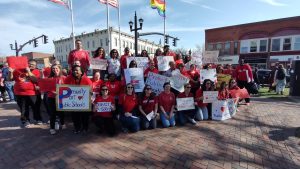Over-Militarization Causes Gun Violence
September 16, 2016
Gun control measures have historically been enforced by racist laws that have been used to explicitly discriminate against marginalized people, as Josh Ashkinaze pointed out in his Sept. 9 Review article “Progressives Should Oppose Gun Control.” He calls it “deeply ironic” that “progressives” support a movement with such a past, but his proposed solutions of wariness, the creation of federal gun registry and use of “smart gun” technology are inadequate and obscure the reality of homicidal gun use in the U.S.
Being wary of the methods by which laws are implemented is logical and necessary due to the reality of police brutality, but caution should not hinder efforts to create real and substantive anti-gun legislation, as Ashkinaze suggests. In lieu of waiting for people to give up their guns out of the goodness of their hearts, real effort must be made to lessen the sheer amount of deadly weapons in our society. My fear is not that some angry person will steal someone else’s legally owned gun and hurt someone; my fear is that someone who legally owns a gun will get angry and hurt someone. This fear is not unfounded. Ownership does not require the ability to use a gun safely or with diligence and thought, and a gun registry won’t fix this.
We need to make laws that aren’t racist, and we need to change how those laws are implemented. The people who will disproportionately fire at and kill people of color — the police — are not the people who can be expected to make sure these laws do not disproportionately affect people of color and other vulnerable groups. Those affected by intimate partner violence have been statistically less likely to be killed by guns when background checks on gun purchases work effectively. But to be blocked by a background check, the purchaser has to already be recognized as an abuser by the system in place. And seeing as if there is a gun in the house, a woman is more than five times as likely to be killed in an event of domestic violence, what is the justification for allowing guns to be so prevalent in homes in the first place?
Ashkinaze notes that minorities are discriminatorily targeted by law enforcement in gun control enforcement. However, the response to this should not be to give up on all attempts of gun control, but to question how our system operates and change its faults. Why does our police force need guns? Why is it so militarized in the first place, and does that send an inaccurate message to the public that the U.S. is dangerous enough to warrant owning your own personal arsenal? Gun control for civilians and law enforcement is necessary and urgently needed. Quite simply, more people die by guns in the U.S. because we have more guns at every level of society.
So I will continue to support gun control, radical gun restriction, or better yet, the ultimate ideal of a completely gun-free society. We need new methods to control guns, that is undeniably true — but “progressives” should not give up on the ideal of gun control any time soon.


















